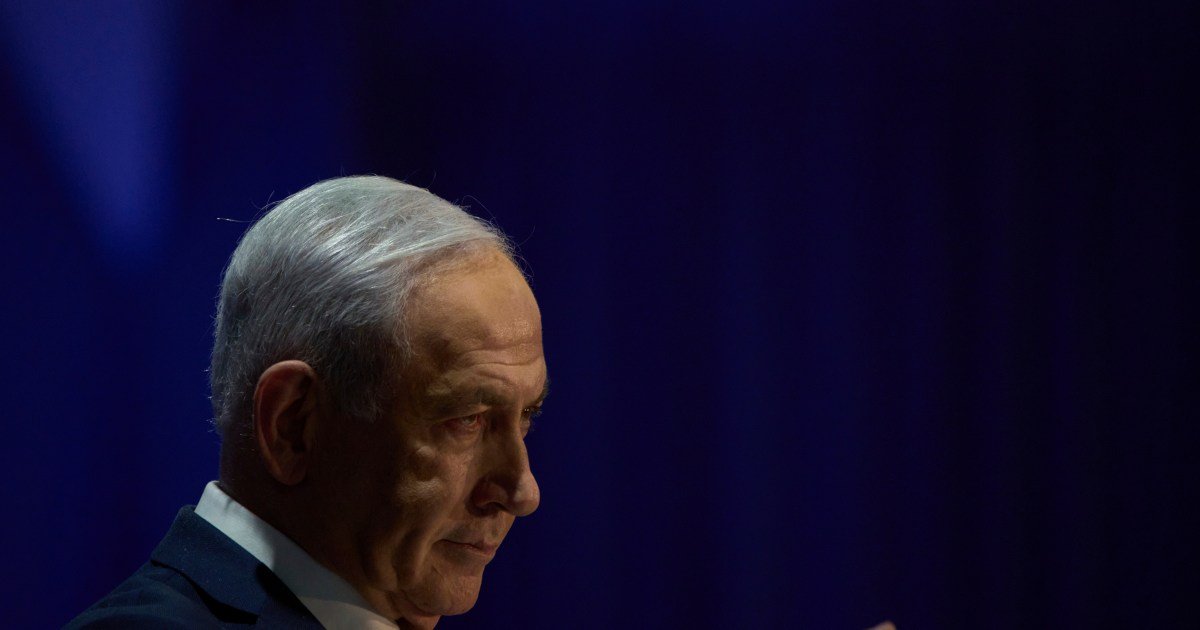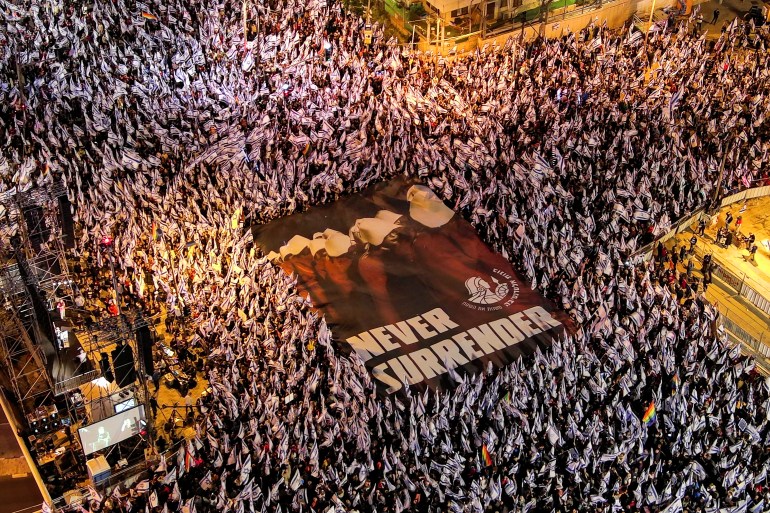Middle East
A ‘coup d’etat’: Israel’s Netanyahu pushes ahead with his judicial changes | Israel-Palestine conflict News

In just 10 days, Israeli Prime Minister Benjamin Netanyahu has broken the Gaza ceasefire, tried to dismiss the head of the Shin Bet intelligence agency, orchestrated a no-confidence vote on the attorney general, and passed a law to change how Supreme Court appointments happen.
The legislation, passed last Thursday, will allow Netanyahu to change the court’s makeup in his favour, his critics say. The change will come into effect in the next parliamentary term.
The move has raised concerns about the independence of Israel’s judiciary and questions about what can be done to stop what seems like a concerted effort to hobble that independence.
Israel’s Supreme Court
This new law changes the composition of the Judicial Selection Committee, making it easier for politicians to stack future appointments to the Supreme Court in their favour.
With three missing from the panel of 15 judges on Israel’s highest judicial authority, the question of how their replacements will be appointed takes on sharper importance.
Supreme Court President Esther Hayut retired on October 16, 2023, and Justices Anat Baron and Uzi Vogelman retired shortly after.
The new law replaces the two Israel Bar Association nominees on the Judicial Selection Committee with two attorneys nominated by both the governing coalition and its opposition.
The rest of the committee remains as is – three Supreme Court judges, the justice minister, two members of parliament (traditionally, parliament chooses one from the government and one from the opposition) and one minister chosen by the cabinet.
Israel’s Attorney General, Gali Baharav-Miara, described this as “[changing] the judicial selection method to one in which … political considerations receive precedence and decisive weight – and on the other hand, the place of professional considerations in the judicial election process is greatly weakened, even erased”.
Judge selection, Baharav-Miara added, would now be subject to political negotiations and compromises, allowing personal motivations to damage “the apolitical character of the act of meting justice at all levels”.
“This latest move is very simply a coup d’etat,” Eli Salzberger, law professor at the University of Haifa, told Al Jazeera.
“The government already controls the legislature. By gaining control of the judiciary, it essentially removes the last of the checks and balances upon it and assumes unchallenged power.”
Yesh Atid, opposition leader Yair Lapid’s party, and the Association for Civil Rights in Israel, a civil society organisation, said they have appealed the legislation to the Supreme Court.

Government vs the judiciary?
According to Netanyahu and his allies, the Supreme Court is blocking them from enacting the “will of the people”.
Thursday morning’s vote was part of a wider programme announced to almost immediate public protests in January 2023.
The initial proposals included granting the Knesset the power to overrule the Supreme Court through a simple majority, blocking the court from reviewing or challenging Israel’s Basic Laws and, as with the latest law, increasing the role of politicians in the appointment of Supreme Court justices.
So far, other than Thursday’s legislation on the appointment of the court’s justices, progress on the government’s suggested changes has been mixed.
In July 2023, the Knesset passed the “reasonableness” law, which curbed the Supreme Court’s power to overturn government decisions the judges consider unreasonable.
However, in January of the following year, the Supreme Court declared the “reasonableness” law unconstitutional, dealing a blow to Netanyahu’s plans.
He and his government argued that court interventions – including striking down a law allowing outright expropriation of Palestinian land in 2020 and overturning a proposed ban on Palestinian parties – undermine the will of the government.
Channelling the rhetoric of United States President Donald Trump, on whose patronage Netanyahu has come to depend, the prime minister suggested that the judiciary is part of a “leftist deep state” trying to thwart him.
Israeli democracy is not in danger. The Israeli Deep State is in Danger. pic.twitter.com/A3hzD5Ckio
— Benjamin Netanyahu – בנימין נתניהו (@netanyahu) March 26, 2025
Personal objections
Netanyahu’s critics – like Hayut as she was leaving office – pointed out that his “reforms” seem geared towards his personal and political ends.
“Everything with Netanyahu boils down to his survival,” Salzberger said, “Five to seven years ago when these reforms were suggested by the members of his party, Netanyahu dismissed the idea, claiming Israel was a country governed by law.
“Since … his corruption trial, he’s been looking for any opportunity to get out of difficulty, and if that involves destroying the entire legal system, so be it,” he said.
Currently, the prime minister is on trial, including on charges of bribery, fraud and breach of trust, in three corruption cases.
Prosecutors allege that Netanyahu accepted illegal gifts from wealthy businessmen and sought favourable media coverage. Netanyahu denies the charges, claiming they are politically motivated.
In April 2021 in the face of growing public concern over potential conflicts of interest resulting from his trial, the Supreme Court imposed restrictions on Netanyahu’s powers to oversee law enforcement, judicial appointments and influence any issues directly affecting his legal difficulties.
In January 2024, it pushed back on a law passed as part of the government’s flurry of “judicial amendments” in 2023 that would make it harder to declare Netanyahu unfit for office, saying it was clearly for his personal benefit and delaying its implementation until the next parliamentary session.
“The personal affairs of the sitting prime minister were not just the motive for legislating the amendment but also the dominant justification for its legislation at the time it was enacted,” Hayut wrote at the time.
“The amendment’s promoters wanted the amendment to enter into force immediately and that it apply to the sitting prime minister.”
Israeli anger
Opposition to Netanyahu’s judicial overhaul has been overwhelming with mass protests during almost every stage of it.
He declared the overhaul suspended in March 2023 due to what he said was “a sense of national responsibility”.
At the time, groups as diverse as legal professionals, civil society organisations, academics, opposition parties and tech workers took to the streets to denounce the reforms, culminating in what organisers said were the largest protests in Israeli history.
Opposing them were the prime minister’s allies on the far right, such as Finance Minister Bezalel Smotrich and National Security Minister Itamar Ben-Gvir.

The mass protests, coupled with public criticism by then US President Joe Biden, were enough to pause, then apparently derail, the government’s plans. As the war Israel launched on Gaza at the end of 2023.
But last week, under the cover of the war, Netanyahu restarted his attempts to overhaul the judiciary.
And this time, Netanyahu and his coalition seem unwilling to stop their efforts to remove any elements of the judiciary that may slow them down. And the attitude of the current US president towards the judiciary is markedly different from that of his predecessor, so no pressure is to be expected from his side.
Public anger at Netanyahu’s moves has not abated.
While the Supreme Court itself could take action, its powers only allow it to delay legislation, meaning that, given his continued parliamentary support, Netanyahu will eventually be able to force his reforms through, as long as he remains in power.
That, analysts say, leaves one main way for Netanyahu to be stopped if the Supreme Court can delay him long enough: a loss for the prime minister and his allies at the next elections, which have to take place by the end of 2026.
